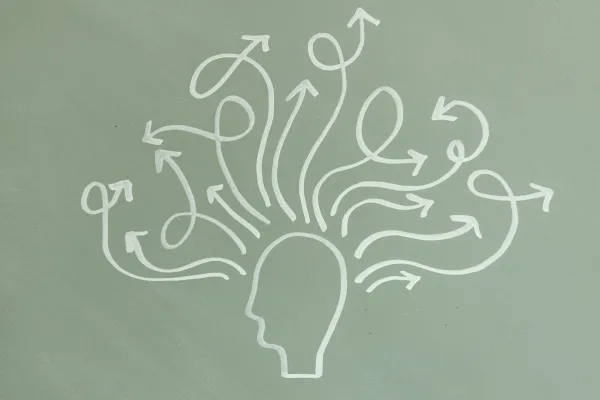
If Your Mind Feels Like a Browser With 100 Tabs Open… Read This
I Can’t Focus, My Brain’s in a Fog. Could It Be Adult ADHD?
Tell me if this sounds familiar…
You walk into a room and forget why.
Your to-do list multiplies like rabbits, pero your brain? Nada.
You’re exhausted but wired. Scattered but sensitive.
You blame stress, hormones, burnout, y la vida en general. But what if there’s more to the story?
If you feel like your brain’s wrapped in cotton, like small tasks require Olympic-level effort, or like you’re just never on, there’s a chance you’re dealing with inattentive-type ADHD.

What Even Is Inattentive ADHD?
This isn’t the hyper little boy stereotype from the 90s commercials. Adult inattentive ADHD is quieter, sneakier, and more emotionally exhausting.
Instead of bouncing off walls, it might look like:
Missing appointments you really meant to remember
Getting distracted mid-conversation (and zoning back in like, “Sorry ¿qué?”)
Procrastinating until your anxiety becomes your productivity coach
Feeling like your brain wants to focus, but just... can't turn the key
It’s not that you don’t care. It’s not that you’re lazy. It’s that your brain—specifically, your executive function system is wired a little differently.
Common Signs (That Are Often Dismissed)
✅ Persistent brain fog - even with sleep, hydration, and vitamins
✅ Easily distracted (not just by noise, but by your own mind)
✅ Chronic procrastination (not from fear, but paralysis)
✅ Memory glitches and forgetfulness
✅ Overwhelm that spirals fast, even with simple tasks
Why So Many Women Are Misdiagnosed (Or Missed Altogether)
Here’s the tea: most women with inattentive ADHD get diagnosed with anxiety, depression, or are told "you’re just overwhelmed".
And yeah, those things might also be true… but what’s underneath the overwhelm?
Inattentive ADHD often hides behind:
Emotional dysregulation
Low energy
Guilt and shame
Trying to hold it all together while feeling like you’re falling apart
And when meds or therapy “kind of help but not really,” it leaves you wondering if it’s you that’s the problem. Amiga, it’s not.
What’s Happening in Your Brain
The root issue is something called executive dysfunction. This is your brain’s ability to plan, initiate, and complete tasks.
Dopamine and norepinephrine (key brain chemicals) aren’t flowing the way they should in areas like the prefrontal cortex. That means you know what to do, you want to do it, but your brain’s like… “Eh, maybe later?”
It’s like trying to drive with no gas. Or una licuadora sin el cable conectado.
How Functional Medicine Can Help (No, It’s Not Just About Supplements)
Medications are absolutely valid tools—but they’re not the whole toolbox. At SoulBody, we ask deeper questions:
What’s driving the imbalance? Where is your body asking for support?
Let’s break it down…
1. Functional Testing (Because Google Isn’t a Diagnosis)
Nutrient Panels: Iron, magnesium, zinc, B vitamins, omega-3s which all crucial for brain health.
Blood Sugar: Glucose dips or insulin resistance can mimic ADHD symptoms.
Gut Testing: Gut inflammation = brain fog. It’s not just about digestion, it’s the second brain, amiga.
Hormone Panels: Thyroid, adrenals, and estrogen/progesterone balance can all affect focus and mood.
Food That Fuels Focus
Stable blood sugar = stable brain. Protein at breakfast. Balanced meals. Bye-bye brain fog.
Omega-3s: Chia, flax, and fatty fish feed the brain.
Minerals matter: Leafy greens, nuts, seeds = magnesium plus zinc magic.
Elimination diets: In some cases, gluten or dairy might be messing with your clarity. Try it and see.
3. Lifestyle That Supports Your Brain (and Soul)
Prioritize sleep: No scrolling until midnight because your prefrontal cortex needs beauty rest.
Move that body: Short walks, dance breaks, or yoga boost dopamine naturally.
Mind-body practices: Meditation, EFT tapping, breathwork.
Nature time: Sunlight + trees = mental clarity (aka “Attention Restoration Theory”).
4. Real-Life Tools (That Don’t Involve Shaming Yourself)
ADHD Coaching: Learn structure without burnout.
CBT for ADHD: Retrain your thoughts, not just your schedule.
Executive hacks: Timers, color-coded planners, Post-it notes everywhere. Whatever works!
5. Medication When It’s the Right Call
Functional medicine doesn’t mean “never meds.” It means yes to what works AND creating a system around it.
When used intentionally, meds can create enough focus to implement the holistic tools that support long-term thriving. There’s no shame in that game.
Final Thoughts: You’re Not Broken. You’re Wired Differently.
Inattentive ADHD is not a character flaw. It’s not lack of discipline, intelligence, or willpower.
It’s a neurological condition with tangible support strategies that can shift everything from your focus to your self-worth.
✨ You’re not lazy.
✨ You’re not flaky.
✨ You’re not alone.
You're a beautifully complex human whose brain deserves understanding, not judgment.
Ready to Clear the Fog?
If this blog hit home, and you’re tired of wondering “what’s wrong with me?”—maybe it’s time to ask:
What’s been missed?
What support do I actually need?
Whether you’re curious about testing, root-cause plans, or just want to feel seen, we’re here for it. No shame. No rush. Just support.
👉🏽 Click here to book your free holistix call to see how we can help: https://soulbodyholisticx.com/book-now
References
American Psychiatric Association. (2013). Diagnostic and statistical manual of mental disorders (5th ed.). Arlington, VA: American Psychiatric Publishing.
Kessler, R. C., Adler, L., Ames, M., Demler, O., Faraone, S., Hiripi, E., ... & Walters, E. E. (2005). The prevalence and correlates of adult ADHD in the United States: Results from the National Comorbidity Survey Replication. American Journal of Psychiatry, 162(4), 716–723.
Ramsay, J. R., & Rostain, A. L. (2015). The adult ADHD toolkit: Using CBT to facilitate coping inside and out. Routledge.
Wigal, T. L., Gupta, S., Heverin, E., & Stehli, A. (2022). Efficacy of viloxazine extended-release capsules in adults with ADHD: A randomized, double-blind, placebo-controlled trial. Journal of Attention Disorders, 26(10), 1345–1354.
Sibley, M. H., Kuriyan, A. B., Evans, S. W., Waxmonsky, J. G., & Smith, B. H. (2014). Pharmacological and psychosocial treatments for adolescents with ADHD: An evidence-based review. Journal of Clinical Child & Adolescent Psychology, 43(4), 527–551.
